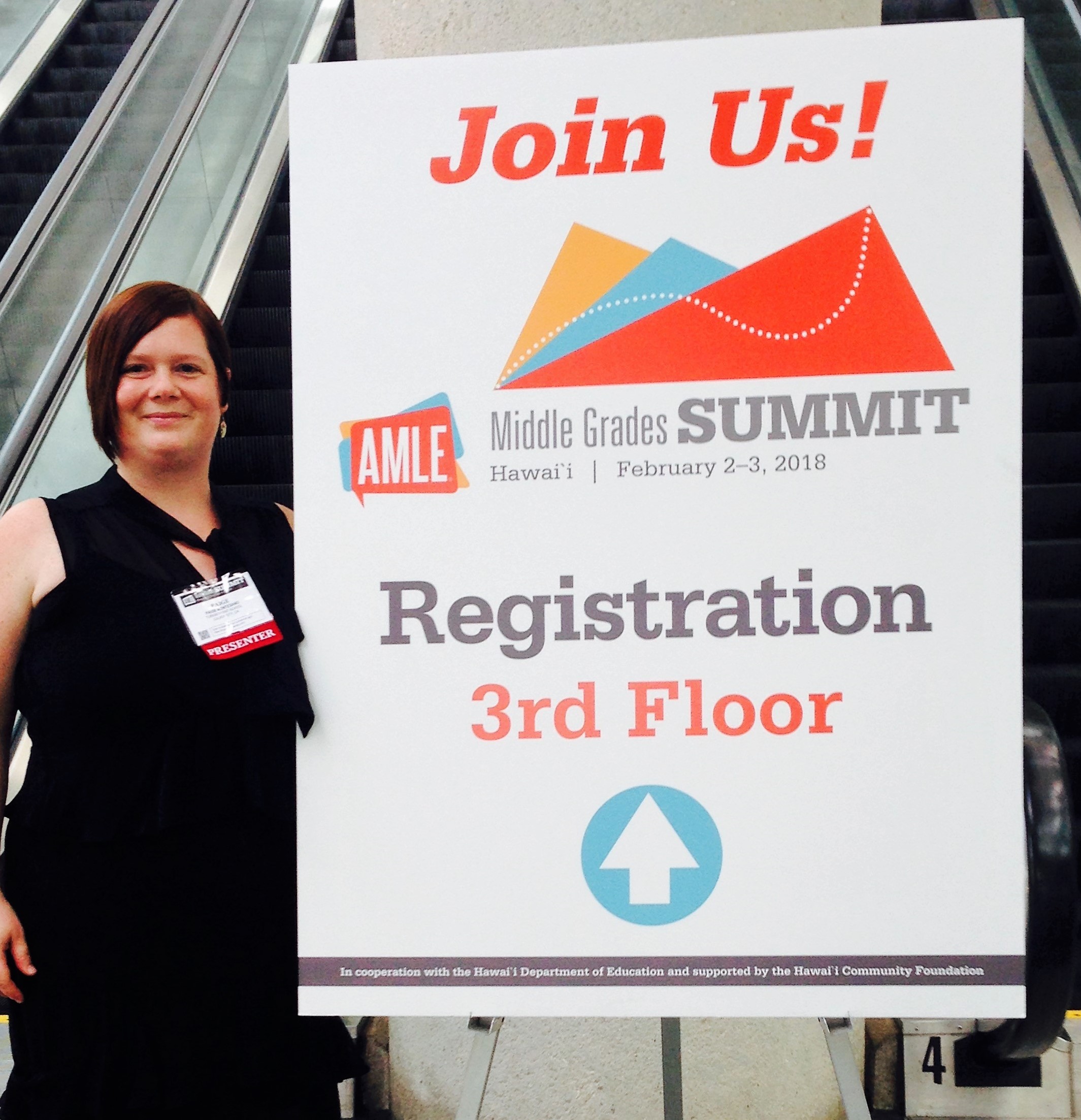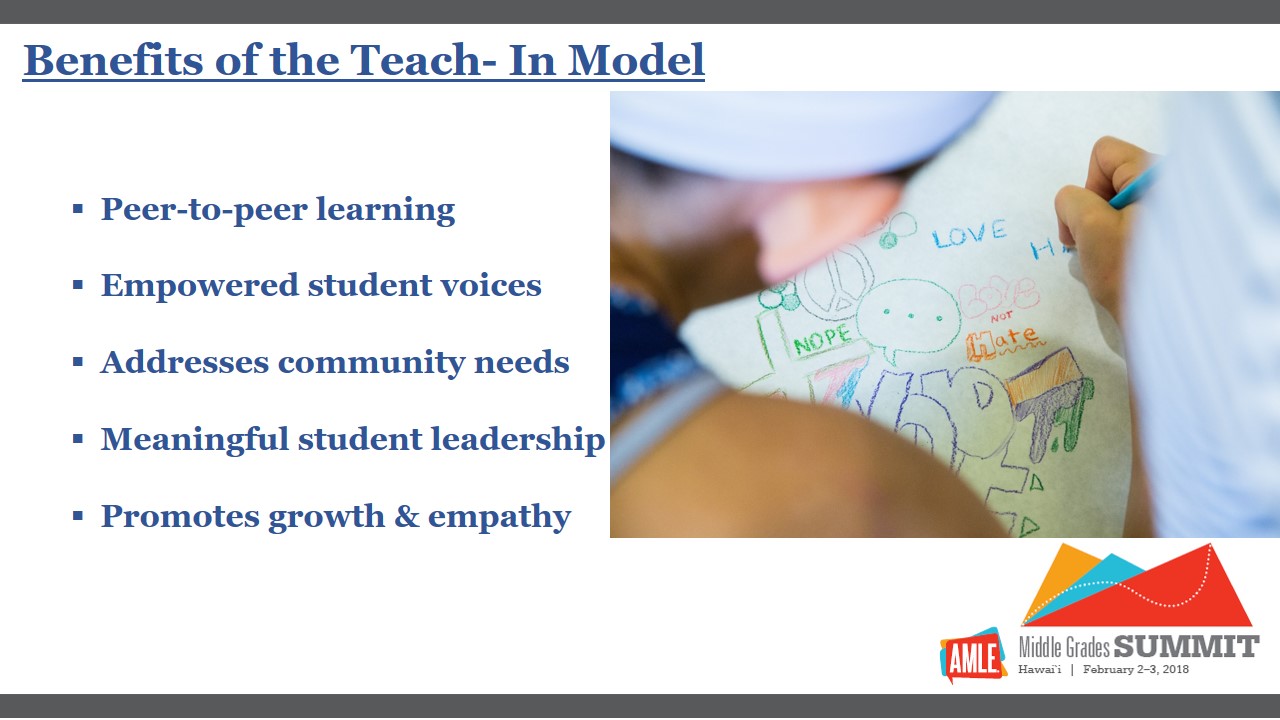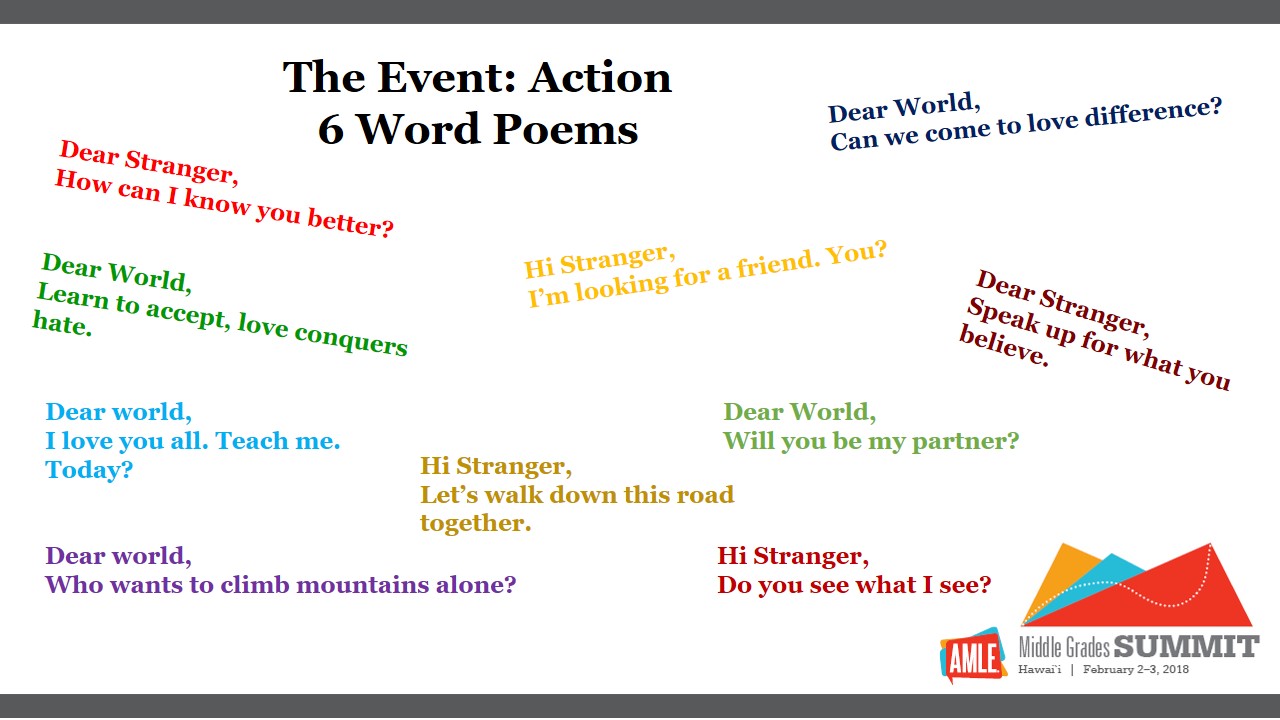 This week, we welcome guest blogger and middle school teacher Ms. Paige Montesano who, at a recent national conference for middle school educators, presented a workshop highlighting an instructional model that allows students to safely explore their reactions to critical current events, and exercise their authentic ability to lead their peers in action. Given the current national climate that has inspired teens to lend their voices to the topic of school violence, we are proud of the work that Ms. Montesano and other educators at Turning Point School are doing to help our students respectfully explore and raise their voices about critical issues.
This week, we welcome guest blogger and middle school teacher Ms. Paige Montesano who, at a recent national conference for middle school educators, presented a workshop highlighting an instructional model that allows students to safely explore their reactions to critical current events, and exercise their authentic ability to lead their peers in action. Given the current national climate that has inspired teens to lend their voices to the topic of school violence, we are proud of the work that Ms. Montesano and other educators at Turning Point School are doing to help our students respectfully explore and raise their voices about critical issues.
———
I recently had the pleasure of sharing Turning Point School’s work in addressing current events related to hate and bias at the Association of Middle Level Educators (AMLE) Annual National Summit in Honolulu, Hawaii. My presentation, titled “A Charlottesville Teach-in: Empowering Student Voices On Complementary Issues,” centered around the Teach-In event Grade 8 hosted this past fall for all middle school students about the hateful events that were occurring in Charlottesville. As a presenter at the AMLE Summit, I spoke to teachers and administrators from across the country about using the peer-to-peer “Teach-In” model to address critical national and international events.
Student-led Teach-Ins harness the power of integrating real-world events into the curriculum and can provide authentic leadership opportunities for middle school students. Attendees of the conference were enthusiastic about integrating this model on their campuses as a way to empower students to explore current issues. Encouraging this dialogue is critical in developing empathic, global thinkers who are unafraid to raise their voices.

While hate in contemporary America is a complex topic, Turning Point’s successful student-led Charlottesville Teach-In provided a space for middle school students to write and talk about the vital role of dialogue, acceptance, and empathy in combating hate and creating peace in our communities. These conversations helped students focus on the importance of considering others’ perspectives and experiences. Grade 8 students prepared for this Teach- In by studying first amendment rights, the role of monuments in our society, and the events that took place in Charlottesville. Students discussed the effects of hate and presented their thoughts on creating a more loving, inclusive society. By approaching these studies from an academic and empathetic lens, students were able to process, analyze, and evaluate troubling events.

In preparation for their Teach-In, students reflected on their learning through writing. A sample of the thoughts they shared with their middle school peers were:
“Today we want to talk about the power to act with love instead of hate.”
“There’s no place for hate. Not in Charlottesville. Not in America. Not in this world. Hate takes up more room than love; it corrupts our society. It turns neighbor against neighbor, peaceful to violent, friend to foe.”
“Many people wonder if it is ok to talk about race in America. By thoughtfully discussing the subjects of bigotry and racism, hate can be abolished.”
When Grade 8 students took the stage last fall, they took action. They were empowered to share their learning and educate their peers. After presenting, students facilitated guided discussion groups. These genuine leadership and collaborative opportunities foster stronger relationships on campus and hone key skills. Discussing complex and relevant topics empower students to be active participants in their world. Throughout this guided discussion, these mixed-aged groups grappled with topics such as:
- Ways to counter hate/create peace in our local and world communities
- The roles of acceptance and empathy in creating a peaceful world
- The role of bystanders
After these heartfelt and sometimes emotional conversations, students wrote six word letters reflecting their thoughts, learning, and wishes. These short letters are hanging around our building as a touchstone to our learning:
Dear Stranger,
How can I know you better?
Dear World,
Learn to accept, love conquers hate.
Dear Stranger,
Speak up for what you believe.
Dear World,
Will you be my partner?
Hi Stranger,
Do you see what I see?

This collaborative event inspired me to pursue the opportunity to present at the AMLE National Summit, with the intent of encouraging other middle school educators to use this model in their schools. During my presentation, I described specific ways that teachers could use design thinking protocols to enhance engagement and hone critical thinking, communication, creativity, and collaboration skills in their students. The presentation explored avenues of fostering leadership and empowering middle school students through designing real world action projects.
As a group, we discussed ways to mirror these teaching practices within a variety of classrooms and campuses in order to open a meaningful dialogue about relevant issues. In a culminating exercise, attendees formed small groups and discussed ways to prepare for and implement a Teach-In. From teachers to administrators, small town to big city, each collaborative group was excited to adapt this model to their needs and clearly saw the many benefits of using Teach-Ins to address critical issues.
It was an honor to be selected by AMLE, an organization whose mission is to improve the educational experiences of all students by providing vision, knowledge, and resources to educators and leaders, to speak at their annual Middle Level Summit. This opportunity highlighted Turning Point students’ incredible work, and showcased our ability to create dynamic learning environments that encourage students to find their voice and take meaningful action. It was a joy to share what we do to such a receptive and supportive audience. As I reflect upon my presentation and the voices of my colleagues from across the country, I am struck by the powerful issues our children face and am proud that our school climate at Turning Point amplifies their voices, allowing them to explore complex topics in safe spaces and take action to reimagine their world.
Paige Montesano
Grade 8 Humanities Teacher, Advisor, and Youth for Change Facilitator


































